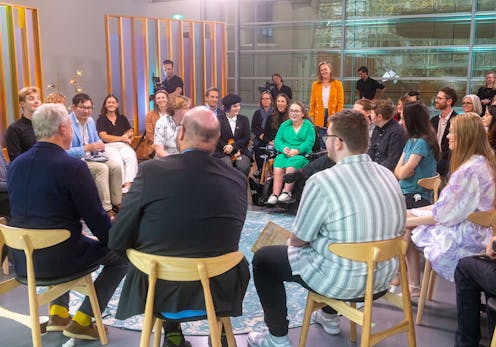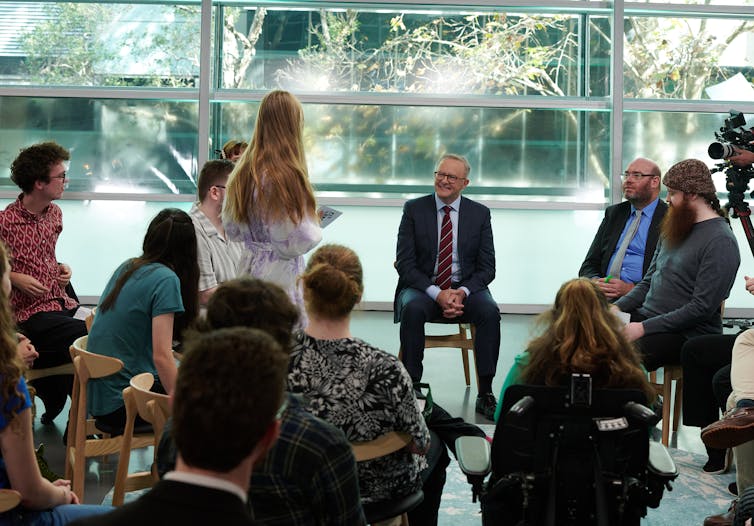
The Assembly, a new ABC documentary series, introduces us to a diverse group of autistic people who are interested in pursuing journalism careers.
The first episode strikes a nice balance between introducing the Macquarie University students, showing their classroom experience and an interview with a celebrity – in this episode, New Zealand actor Sam Neill. Other interview subjects in the series include singer Delta Goodrem, Prime Minister Anthony Albanese and footballer Adam Goodes. The students are mentored by journalist Leigh Sales.
This could have been another cringey reality TV show using autistic people, like myself, to entertain neurotypical people, focusing on their quirks and challenges. The first episode does have one at-home segment with a student’s mother, which jarred a little for me.
But predominantly it shows trainee journalists being encouraged to develop and ask their own questions, about things that interest them. It’s a welcome change from programs which seem to focus on teaching autistic participants to act less autistic.
Here’s what the program does well (based on watching the first episode) and what it demonstrates about autism in study and work settings.
Autistic strengths on display
Contrary to the stereotype that autistic people are all obsessed with numbers, many autistic people have extensive vocabularies and advanced writing skills.
When Neill turns the interview around and asks the team what they have in common, student Stephanie’s response sums up why many autistic people are attracted to journalism:
[…] we love telling stories, sharing stories with each other, and sharing them with people (like you).
Our deep focus and desire to learn means autistic people tend to develop extensive knowledge on topics of interest. We research widely and retain information. This means we can build broad and deep knowledge of a topic. This is a real asset for careers in research, teaching and journalism.
Many autistic people have little interest in small talk. It can be overwhelming and make social communication challenging. But getting straight to the point can create productivity gains and deeply meaningful conversations.
Many autistic people have a natural curiosity and are likely to ask insightful questions. This can be an asset in careers that require critical thinking like engineering, data science (and journalism). In preview footage, the celebrities interviewed for The Assembly express appreciation at how the students’ questions cause them to reflect deeply.
Autistic people are divergent thinkers, who see patterns and make connections others may not notice. This can be a real asset in careers requiring creativity like graphic design, art, urban planning (and journalism).
Autistic people tend to be candid and open, and to accept others just as they are. Perhaps because we ourselves are a little unconventional, or perhaps because we know firsthand how it feels to be judged harshly, we accept and value quirkiness or imperfection in others. This can be a real asset in careers that require understanding and acceptance like counselling, support services (and journalism).
Empathy and then some
There is an outdated stereotype that autism is associated with a lack of empathy.
The reality is autistic people are very empathetic, we may just express our empathy in different ways.
Genuine caring can be a huge asset in professions like teaching, nursing and medicine. We see this on The Assembly when Neill becomes teary during his interview. The students’ responses and the expressions on their faces show they feel his emotions deeply.
A workplace with 4 things going for autistic people
As an autistic person and a mentor for autistic people across diverse careers, there are four key things that stand out to me about The Assembly as a workplace:
1. A culture of inclusivity
The students are encouraged and supported to be themselves and to do what they need to do to be comfortable. They can move around, fidget, speak and interact in ways that are natural to them.
2. The physical environment
Effort was clearly made to ensure the students had access to sensory aids. Tools that enable autistic people to control sensory input and self-regulate have significant benefits for wellbeing. That said, I suspect the realities of television production mean the lighting in that room was pretty intense. Many autistic people have sensory hypersensitivities, with bright lights causing stress, anxiety and pain.
3. A supportive community
There is a genuine sense of camaraderie and support among the students. They want each other to succeed, encourage those who are feeling nervous, and celebrate each other’s achievements.
4. An empathetic leader
We see university lecturers only briefly in the first episode but we see lots of interactions with journalist and ABC host Leigh Sales. She does not speak over, patronise or “correct” the students. She does not try to make them behave like non-autistic journalists.

Read more: Real-life autism disclosures are complex – and reactions can range from dismissal to celebration
What about off screen?
Sadly, the inclusion shown on The Assembly is not the norm in workplaces or universities. The majority of autistic people feel pressured to mask their autistic characteristics in the workplace, with significant negative impacts on their physical and mental wellbeing.
I have previously written on providing more autism-friendly workplaces, and The Assembly illustrates some of these factors (such as support, flexibility and a safe culture).
It also demonstrates that while some autistic people may be suited to roles in IT or cybersecurity, others are ideally suited to journalism.
Every autistic person is different, with their own strengths and challenges. In a truly inclusive society, we wouldn’t be asking what jobs are suitable for autistic people. Rather we would be asking: how can we make this job suitable for this autistic person?
The Assembly premieres on ABC TV and streams on iView from Tuesday August 20, 8.30pm.
Sandra Thom-Jones does not work for, consult, own shares in or receive funding from any company or organisation that would benefit from this article, and has disclosed no relevant affiliations beyond their academic appointment.
This article was originally published on The Conversation. Read the original article.







